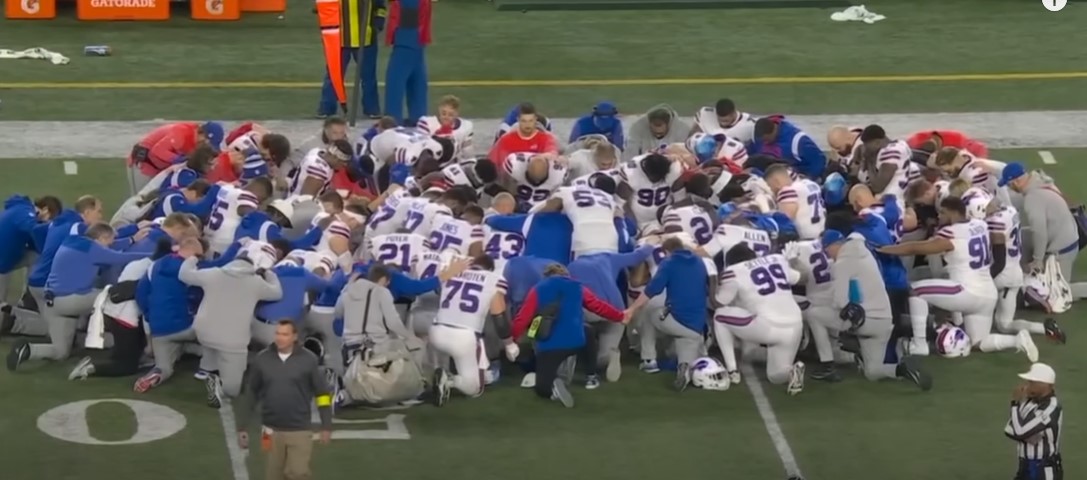
On Monday Night Football, the Cincinnati Bengals hosted the Buffalo Bills. Early in the first quarter, Tee Higgins caught a pass over the middle and was tackled by Buffalo safety Damar Hamlin. It looked like a regular play, nothing dirty, nothing violent. Damar got up and then immediately fell back to the ground. Within minutes, an ambulance was driven onto the field and life-saving CPR was administered by medical professionals. Damar was revived and taken to a Cincinnati hospital. As of Tuesday morning, he is listed in critical condition. The Buffalo Bills have released a statement saying that Damar suffered a cardiac arrest and his heartbeat was restored on the field.
Game is Postponed: Players on both teams were visibly distraught. They formed a circle around this fallen player. Most of them prayed. 15 minutes went by, then 20. Joe Buck, the announcer for the game, was given word that the teams would be given 5 minutes to warm up before resuming play. However, Troy Vincent, executive vice president of the NFL football operations corrected this statement by saying, “Neither coach was talking about resuming play. How do you resume play after seeing such a traumatic event? The competitive aspect never crossed my mind, never crossed our minds.”
The decision to postpone the game was made. This sent a clear statement that life was more important than football. Sportsmanship was more important than competition. Players who just prayed together should not be expected to immediately play a violent game against each other. Bravo to the players on the field and to the 75,000 fans who understood this finer point.
This is the First NFL Game Ever Postponed or Canceled Due to Injury: Now, here is the point that no one wants to discuss. This is the first time that an NFL game has been postponed due to injury. Prior to this moment, players have been paralyzed on the field, knocked unconscious, and have had bloody open fractures. I remember watching players freak out when Joe Theisman’s leg was pointing the wrong way after his career was ended after a violent hit by Lawrence Taylor. I have seen numerous players carted off the field, immobilized in neck and back braces. I have seen countless times when players gathered to pray for injured players. It happens semi-regularly because football is a violent game. It happens at the high school level and the collegiate level. It happens in other sports too. High school golfers get hit in the head while playing golf and soccer players get knocked out when they bump heads.
Joe’s Perspective: Because everyone (players, fans and media) is praising last night’s decision, the line of when to cancel a game changed before our eyes. For the most part, this is a positive step. After all, NFL player Chuck Hughes died on the football field in 1971 and the game was resumed shortly after he was removed by ambulance. Seems more than a bit insensitive. However, where is that line now? If a player dies, of course. What if a player could die? Who determines that? What if a player is driven off in an ambulance? What if a player is knocked unconscious? Do we have a clear line or do we base it on the reactions of teammates? Is the line different for high school, college or the pros?
A good friend of mine died at a Michigan State University football game about 15 years ago. He was late for the kickoff, so he walked quickly up the ramp to his seat in the upper deck. He said hello to friends and then had a heart attack and died. Should the game have been postponed? If we believe that life is more important than football, maybe so. If you are his friend, you might suggest it is rude to play a game while medical professionals are trying to revive him. However, after speaking with security at Michigan State University, they say that they average 5 deaths in the stands each year. Since they only have 7 home games each year, that is almost one per game.
I don’t know the answer to these questions. I just know that I would hate to be a high school athletic director who just watched a player get knocked out for a minute or has to be immobilized on a back brace for precautionary reasons. The players gather for prayer, the crowd is hushed and the ambulance takes away the opposing player. The AD has to decide whether or not to restart the game or send everyone home. If you restart the game, you are an insensitive jerk who has no sportsmanship. If you postpone or cancel, players and fans will be sent home without finishing a game. I can hear the criticism now. It’s a no-win situation.
Your Turn: I know this is a tough question, but pretend you are a high school athletic director, where would you draw the line for postponing or canceling a game due to injury?

This was nice
I feel people should be concerned for this player, because he went into cardiac arrest and that’s very serious.
I would draw the line when a player isn’t conscious or can’t physically get up
Normally I wouldn’t postpone or cancel any game due to an injury.
If an athlete can not continue and it has affected the whole team then the game should not continue
if someone’s life is at risk then the game shouldn’t continue
I would draw the line if someone passes out. We have to make sure they are ok, so that would postpone the game. If their heart stops that’s a good time to really call off the game completely and play at a later date.
I would draw the line when the player is not waking up or in critical condition. If it is unsure whether the player will be ok or not, the game should not be continued because the teammates will be distracted by the thought of whether their team are will die or not. If it is a injury that is not possibly fatal or traumatic, game on.
I think if the event was traumatic enough that it would change the athlete’s life or if the event was psychologically effecting the whole stadium it would be okay to postpone the event.
If an athlete is injured and it is
substantial where it is effecting the rest of the team then they should not carry on with the game. It’s out of respect for both teams and the player who is injured.
If the injury is not life threatening I think that the game should be resumed after the necessary time it takes to help that player off the field. If the injury is life-threatening, such as Damars. The tough decision would be if it’s a player who is paralyzed.
“life was more important than football.”
If it was life threatening than I would postpone a game for an injury.
I would draw the line to then point there i have a lot of injured athletes